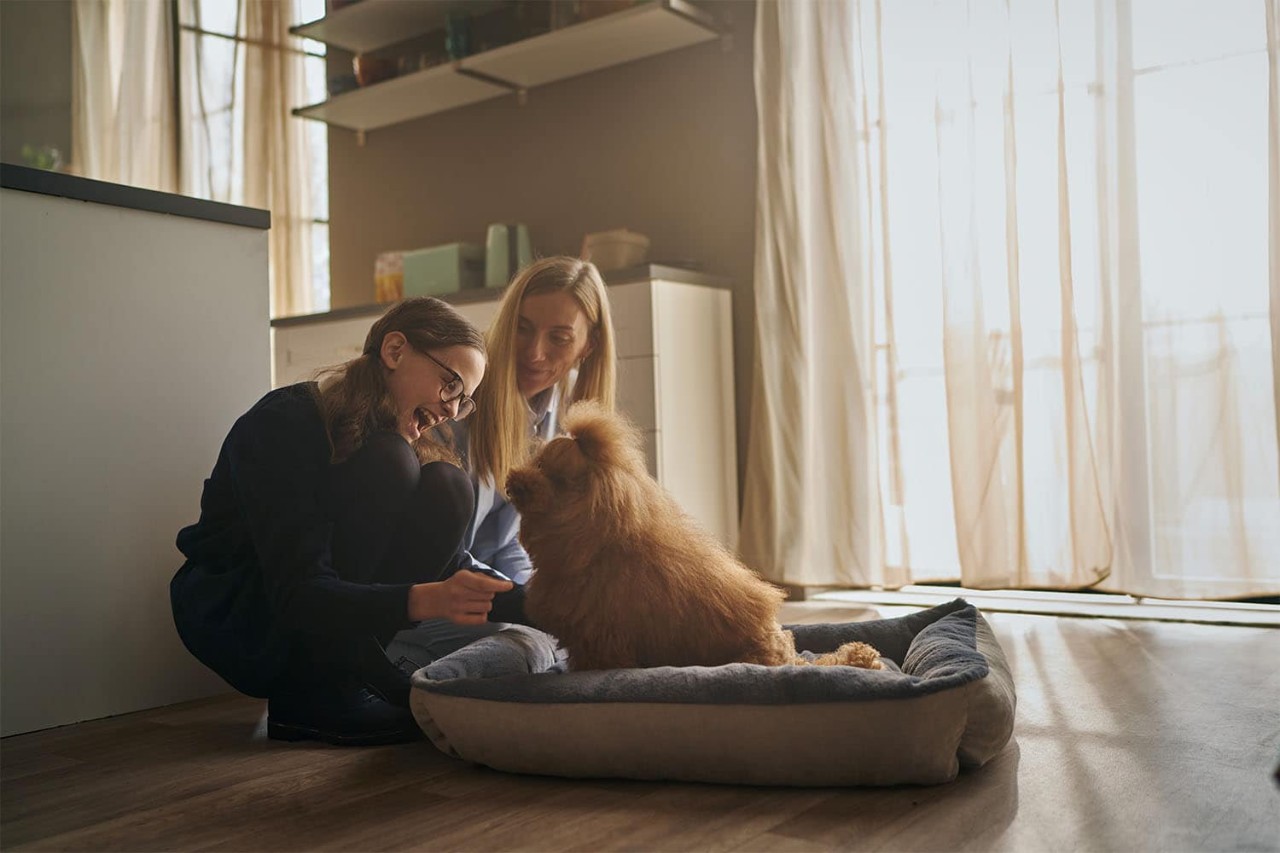A Guide To Buying Your First Home
by Melanie May | 2 min read February 22nd, 2021
Buying your first home is an incredibly exciting experience. Soon, you’ll have your own place to call home.
However, we know that the whole process can be stressful and a little daunting at times. There are many big decisions to make! When do you start applying? Where will you buy? What lender will you choose? How do you find a solicitor? What type of house insurance do you need?
Don’t worry! We are here to make the journey to homeownership a little easier for you to navigate. We’ve created a guide to help first-time buyers through the process step by step — from saving for a deposit, to going sale agreed and getting the keys!
Check How Much You Can Borrow
You might be dreaming of that city centre pad or family home by the sea, but how do you know if you can make those dreams a reality?
First, you need to find out how much you can borrow. This will give you an idea of how much to budget for your first house and how much deposit you need.
The Central Bank sets the lending criteria. The maximum you can borrow is 3.5 times your allowable income.
Most banks lend up to 90% of the value of the home to first time buyers, which means you have to come up with the remaining 10% deposit yourself.
You can find out how much you might be able to borrow by using an online first-time buyer mortgage calculator.
For example, if you can afford to buy a house worth €300,000, as a first time home buyer you might be able to borrow €270,000. Therefore, you’ll need to save €30,000 for the deposit.
Consider the Help to Buy Scheme
The Government’s Help to Buy (HTB) scheme helps first-time homebuyers with the deposit needed to buy or build a new house or apartment. If you decide to buy a new build, take a look at the scheme to find out how and when you should apply. You could claim up to €30,000 to help you buy your new home.
Save the Deposit
Deposits require a lot of savings, sometimes it can take years to get your deposit together - The sooner you start saving, the closer you become to getting your first home!
On top of your deposit, don’t forget you need to have enough money to cover stamp duty (1%-2% of the house price), legal fees, survey costs, valuation fees and moving costs.
Once you have worked out the additional costs associated with buying a home, it’s time to save, save, save!
Create a Budget
There are a lot of costs associated with owning a home. It’s not just the mortgage repayments you need to consider. You have to factor in mortgage protection insurance and home insurance too, as well as running costs like heating and electricity, tv, internet, property tax, bin charges, tv licence, maintenance, repairs and any management fees that you might have.
You need to budget what you can comfortably afford to pay each month. Once you have this budget drawn up, you can then reassess how much of a mortgage you can truly afford.
Fix Your Finances
Most lenders ask to see your last six months current account, savings and, if applicable, Credit Union statements. So get cracking on improving your financial health. Lenders want to see that you can afford the mortgage repayments. Ensure your accounts look good — no wild spending, no unauthorised overdrafts, no missed loan repayments. Set up a regular savings plan too and don’t dip into your savings unless it is an emergency.
Look for a Lender
Once your finances are in order and you have your deposit and money for the additional costs of buying a home, it is time to look for a lender.
You can approach lenders yourself or use a mortgage broker.
You can apply for a mortgage online, over the phone or in a branch.
There are plenty of resources online that compare lenders and mortgages. It is a good idea to shop around and look at the overall cost of the mortgage rather than be swayed by attractive sounding cash back offers.
Each lender has its own list of documents that you are required to submit with your mortgage application but almost all ask for:
- Identification
- Evidence of current address
- 3 months’ payslips
- 6 months’ current account statements
- 6 months’ savings bank account/Credit Union statements
- 12 months’ loan account statements for all existing loans including existing mortgages
- A recent P60 if you are a PAYE employee
- 2 years of certified audit accounts if you’re self-employed
Getting Approval in Principle
If your application is successful, the lender will give you an Approval in Principle (AIP). This letter will indicate the amount they could lend you, based on initial checks. Approval in Principle is usually valid for six months.
Having AIP will help you know your budget when house hunting and will show estate agents that you are a serious buyer. If you put in an offer on a house it is more likely to be accepted if you have AIP.
Find a Solicitor
Congratulations, you have your Approval in Principal, now it is time to find a solicitor to do the conveyancing, the legal work involved with buying and selling a property.
If you don’t already have a solicitor, ask for recommendations from friends and family or use the Law Society website to find one.
Fees and charges can vary so it is worth your while to shop around and ask for quotes and compare prices.
With your mortgage Approval in Principle and your solicitor in place, you are in a great position to start making offers on your dream property.
But first, you need to find your dream property.
Start House Hunting
Now comes the fun part! It’s time to find your dream home.
Scour the internet, newspapers, auction and property websites. Sign up for estate agent mailing lists and newsletters. Drive around the areas where you want to buy and look out for ‘For Sale’ signs. Keep searching until you find a property that matches your criteria in your desired location.
When you find a suitable property, contact the estate agent to arrange a viewing.
At the viewing, make sure you find out all you can about the property. If possible, take someone with you who has experience with buying properties.
Make an Offer
When you have done all your research and found a property that you love, it is time to make an offer they can't refuse.
Work out your budget and stick to it. Consider the prices of recently sold properties in the area. Factor in how much you'll need to spend on doing up the property.
Do everything you can to put yourself in a strong buying position. Show your Approval in Principle letter, proof of funds and proof that you aren’t waiting to sell another house. Sellers might look more favourably on your offer if they think the sale will go through quickly without any delays.
Apply for a Mortgage
When your offer is accepted the property is considered to be ‘sale agreed’. This is when you pay your booking deposit. This deposit is refundable up until you sign the contracts.
The estate agent will then start sending off the required paperwork to your solicitor and the seller’s solicitor.
It is now time to go back to your lender with the property details and your solicitor’s details so the lender can finalise the mortgage for your new home.
Get a Valuation
To finalise your first-time buyer mortgage, a valuation of the property needs to be carried out. This report describes the property and its estimated market value. The valuer must be from your lender’s panel and you will most likely have to cover the cost of the valuation yourself.
Once this has been received and all other lending conditions have been met, your lender will issue you your formal loan offer.
Top Tip: If the house you are planning on purchasing has a low Building Energy Rating (BER) ask your lender if it has a ‘green mortgage’ offer with a lower interest rate for energy-efficient homes.
Get a Structural Survey
First-time buyers, especially those buying a second-hand home, should have a comprehensive full structural survey carried out on the property. Do not scrimp on this part!
This detailed report will tell you about all the visible and accessible parts of a building, including roofs, walls, floors, windows and doors, chimneys, basements, garages and outbuildings. It is basically an NCT for the property.
We highly recommend you have a full inspection carried out as it will highlight any issues you may not have been aware of when you made your offer. For example, if it turns out that the roof needs to be replaced for €6,000, you could shave this off your offer price or decide not to buy. Best to find out these things now than when you move in!
Take Out Insurance
Your lender won't issue your mortgage cheque until you take out mortgage protection insurance and home insurance. At Allianz, we can sort you out with home insurance in a jiffy! At Allianz.ie, you can get an online home insurance quote in minutes.
Once you’ve taken out your home insurance, you will receive your policy documents which will include an indemnity letter. You will need to provide this to the bank.
Sign the Contracts
Offer accepted. Mortgage secured. It's time to seal the deal.
Your solicitor will carry out all the appropriate checks and once they are happy with the legalities surrounding the sale, you can sign the contracts. When all the documents have been signed and delivered on both sides, you will receive the closing date. The balance of the funds needs to be transferred to the seller by this date.
When this happens you become the new owner of the property. Hurrah! You are officially a homeowner.
Move In
Congratulations on buying your first home. It’s time to collect the keys and move in. Now the fun can start. Throw a paint party. Start decorating. Put your stamp on the property. In no time at all your new house will start to feel like home.
Allianz p.l.c. is regulated by the Central Bank of Ireland. Standard acceptance criteria, terms & conditions apply.






